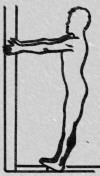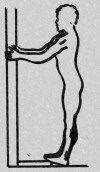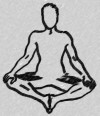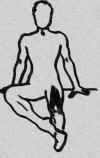|
The Stark
Reality of Stretching
Dr. Steven D. Stark's book
'The Stark Reality of Stretching' explores how muscles stretch and what
the best stretches are for the lower body. His basic concept is that stretches
should be very gentle. Extreme stretches generally stretch the ligaments
or tendons and can adversely affect the
integrity of the joint. In other words you may
have a great range of movement, but your joint may be buggered!
For a powerlifter this makes a lot of sense. Several
people in the STRENGTH email have expounded that you should not stretch.
In fact, if you read the book you will realize that you can not maximize
your strength without stretching. A muscle which is elongated through stretching
is able to generate a more powerful contraction. However, improper stretching
is worse than no stretching as it will loosen or damage the joints and
make proper technique in the squat, bench press and deadlift impossible.
Stark has five basic laws which apply to all stretches.
1. Isolate the muscle group. This gives
better bio-feedback and control of the stretch.
2. Find zero tension. This is the place
where there is no tension on the muscle to be stretched or the area around
it.
3. Find the first awareness. This is where
you first are aware that the muscle is being stretched. This is a far as
you go in the stretch!
4. Less is best. The more gentle the initial
muscle load the faster the muscle will relax back to its resting length.
5. Allow the loss of tension. The stretch
is held until there is no tension in the muscle. This allows elongation
to take place.
Here are the five basic stretches for the lower
body. (images will be added soon)
Stretch #1 - Gastrocnemius Stretch
The best position is to isolate the muscles by
standing with the entire ball of both feet resting on a raised surface
and the heels bearing weight - firmly on the the ground.

Lean backward, away from the doorframe or pole
you are hanging onto, to reduce the muscle tension to zero. . Then pull
forward just far enough to achieve a gentle tension on the gastrocnemius
muscle. Hold until the first tension is gone. Repeat for a second
tension and release.
Stretch #2 - Groin Stretch
Sit, rest your back against something, allow legs
to fall laterally as illustrated. Start with the feet far enough
away from the body that there is no awareness of tension in the groin muscle.
Bring the feet towards the pelvis until that first gentle tension is felt.
Hold until there is no tension. Repeat.

Stretch #3 - Quad Stretch
I prefer to do this standing. All the same rules
apply. Zero tension, first awareness, hold until no awareness, repeat.
Grasp the ankle, not the foot. 
Stretch #4 - Hamstring Stretch
All the same rules. Its very important that the
stretch be felt in the hamstring muscle and not in the area around the
knee or the tendon inserting into the knee. Note the shallow angle of the
other leg.  
I don't get much out of this and prefer to do the
stretch with the towel. Note that the knee is held at about a 15
degree angle. You get the idea!.jpg)
Stretch #5 - Gluteus Max and Hip Stretch
As in diagram lie on your back. Apply all the same
rules. I prefer to put my foot of the bottom leg against the wall instead
of on the floor - I'm sure most of you with thick legs will soon figure
out why. My knee problem has really improved since doing this stretch.
 
If more information is required I can answer some
questions on technique, but for theory - read the book!
|
|

|
Want to discuss this with other lifters?
|
Then click here:

|
|
Reproduction of this article, in whole or part,
for any purposed other than personal use is prohibited without written
consent. Copyright 1998 Keith Hobman.

|

